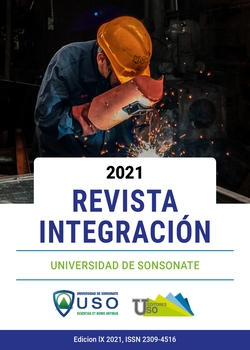Skills demanded by the local industry of industrial engineering graduates from the University of Sonsonate
DOI:
https://doi.org/10.5377/ri.v1i9.18410Keywords:
Competencies, Professional, Employers, TrainingAbstract
Professional skills are components that are linked to the known figure that create understanding of the conjunction of procedure, line of action, and achievements that are required of industrial engineering. Education is a process that is executed through the union of two functions: teaching and learning, which best encapsulates abilities which will create competency.
The rapid growth of technologies and communication, the rising development of information in the social environment, assist the educational system to be transformed in a continuous change through new demands and values. The objective of this investigation is to increase capacity which leads to graduate careers which also consider competent evaluations in general. A descriptive methodology was applied with analytical documentation and questionnaires, using qualitative and quantitative data.
The job field in industrial engineering is vast and with the generalized training there are requirements that employers seek which are developed in their professional career. In this research there are methodologies which are used to identify what are the main skill sets and competencies an employer is looking for. To achieve the aforementioned goal, a field study was conducted through interviews which established a recollection of data which allowed to identify and conclude the relevancy of the key competencies needed in the industrial engineering field.
138
Downloads
Published
How to Cite
Issue
Section
License

This work is licensed under a Creative Commons Attribution-NonCommercial-ShareAlike 4.0 International License.
You are free to:
- Share — copy and redistribute the material in any medium or format
- Adapt — remix, transform, and build upon the material
- The licensor cannot revoke these freedoms as long as you follow the license terms.
Under the following terms:
- Attribution — You must give appropriate credit , provide a link to the license, and indicate if changes were made . You may do so in any reasonable manner, but not in any way that suggests the licensor endorses you or your use.
- NonCommercial — You may not use the material for commercial purposes .
- ShareAlike — If you remix, transform, or build upon the material, you must distribute your contributions under the same license as the original.
- No additional restrictions — You may not apply legal terms or technological measures that legally restrict others from doing anything the license permits.
Notices:
You do not have to comply with the license for elements of the material in the public domain or where your use is permitted by an applicable exception or limitation .
No warranties are given. The license may not give you all of the permissions necessary for your intended use. For example, other rights such as publicity, privacy, or moral rights may limit how you use the material.




